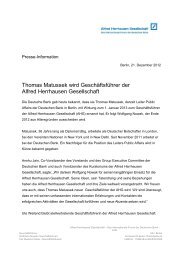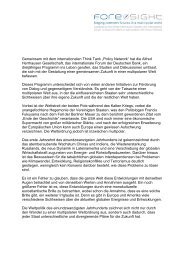Charting new directions: - Alfred Herrhausen Gesellschaft
Charting new directions: - Alfred Herrhausen Gesellschaft
Charting new directions: - Alfred Herrhausen Gesellschaft
Create successful ePaper yourself
Turn your PDF publications into a flip-book with our unique Google optimized e-Paper software.
44<strong>Charting</strong> <strong>new</strong> <strong>directions</strong>: Brazil’s role in a multi-polar worldthe aim of reducing poverty viaincome transfer to the underprivilegedsegments of society will be the definingtone of the coming years.disease, it is vital to manage and devalue the currencyas opposed to allowing it to fluctuate at the mercy ofthe markets. A coalition of interests led by financialcapital has so far blocked devaluation of the currency.Since cheap imports help control domestic pricesensuring purchasing power for consumers, especiallyextremely low-income groups, there is pressure tokeep imports at this level. Moreover, cheap importsprovide the traditional middle class access to importedproducts (while a strong Brazilian real also makesinternational travel more affordable). An overvaluedcurrency is also favourable for international holdersof capital who profit from making speculative cashinvestments in Brazil that yield high rates of interestin a strong currency.Detractors of a highly valued currency includeindustrial entrepreneurs, factory labourers andexporters. There is growing concern within industryover the relentless decline in manufacturing activitysince the early 1990s. These claims provided groundsfor the government to levy a two per cent tax onspeculative capital in 2009 amid the global financialcrisis. The measure, albeit timid, acted as a brake onfurther currency valuation, while also indicating theexistence of significant social sectors concernedwith the Dutch disease. The valuation of the Brazilianreal and how to balance the competing interestsof those who favour a higher value and those whofavour devaluation remains a significant challenge forthe current government.Interest rate and creditBrazil has one of the highest interest rates in theworld. High interest rates are known to stymieinvestment in manufacturing since capital yieldsearnings without the need “to make anything”. Highrates also lead to a transfer of public funds - whichcould be dedicated to creating infrastructure - into thehands of those who seek profit for reinvestment or tospend on luxury consumer goods. Business ownersin the manufacturing sector (for whom the interestrate is critical) and labourers in general (for whomincreased employment is critical) have momentarilyjoined forces in the fight against high interest rates.At the same time, the expansion of credit duringPresident Lula’s second term (rising from 25% to40% of GNP) went ahead despite opposition fromprivate banks. This expresses the government’sincreased ability to compel the banks to lend to thepublic. The support from the Brazilian DevelopmentBank (BNDES) as financiers was crucial for offeringlower interest rates to industrial companies. But theferocity of the battle to maintain high interest rateswill also relate to the enormous clout accumulatedby the financial sector under the bannerof globalisation.The social agendaIrrespective of the result of the frictions set to markthe political cycle, the aim of reducing poverty viaincome transfer to the underprivileged segmentsof society will be the defining tone of the comingyears. Universal rights to health, education andsecurity cannot materialise without increased publicinvestment. In Brazil, huge swathes of the populationdo not yet have basic sanitation or even minimal qualityhousing. Besides the cash transfer programmes,other programmes for health, education and publicsecurity are fundamental to reduce poverty andinequality. This calls for huge expenditure, along witha government equipped to exercise key functions.Equally important is the continuing need to valuepublic functionaries by restructuring the careers andincreasing the pay of civil servants.No consensus has been reached concerning thesize and scope the government should have in Brazil.Similarly, no agreement exists on the tax reformsAdvancing a <strong>new</strong> deal for Brazil | André Singer








